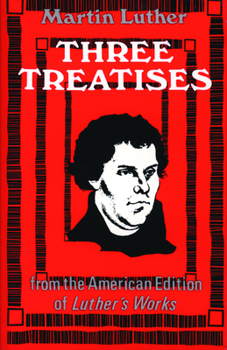Three Treatises Paper
Select Format
Select Condition 
Book Overview
Martin Luther posted his Ninety-five Theses on the church door at Wittenberg in 1517. In the three years that followed, Luther clarified and defended his position in numerous writings. Chief among these are the three treatises written in 1520. In these writings Luther tried to frame his ideas in terms that would be comprehensible not only to the clergy but to people from a wide range of backgrounds. To the Christian Nobility of the German Nation is...
Format:Paperback
Language:English
ISBN:0800616391
ISBN13:9780800616397
Release Date:November 1990
Publisher:Fortress Press
Length:322 Pages
Weight:0.66 lbs.
Dimensions:0.8" x 5.0" x 8.0"
Customer Reviews
5 ratings
Three Treatises. Martin Luther.
Published by Thriftbooks.com User , 17 years ago
Yes, Luther had his faults; in all honesty they are well documented and cannot be denied. But if we proceed in this honest assessment, we must admit that if only a small fraction of his case against the Roman papacy were true, it would be a very damning case indeed, enough to forever impeach Rome's claim as the one "true" church and the pope's claim to be Christ's 'stand-in', the 'Vicar of Christ'. After those aspects of Luther's case that can be assailed as being inaccurate are whittled off, what remains is the lion's share of his expositions, a well-argued prosecution of the papal office and its corruption of the western church. The most important of Luther's essays stand with the greatest of Christian commentaries and expositions. Yes, there are many other voices of Christian (Eastern, Protestant, and Roman) consequence, down to our present day, but in terms of historical impact, few stand with Luther. This volume from Fortress Press, includes English translations of three seminal essays produced in 1520: To the Christian Nobility of the German Nation, The Babylonian Captivity of the Church, and, The Freedom of a Christian. They represent the heart of Luther's case against the Roman papacy, and the heart of the Reformation. His case cites many specific points, is filled with both reverence for God and scripture, and contempt for the self-aggrandizement, politicking, callous money-grubbing, and arrogance of the papal office holders and papist "flatterers": "If the pope in Rome can grant dispensations and scandalously sell them for money, then every priest may give the same dispensations without price and for the salvation of souls. Would to God that every priest were able to do and remit without payment all those things we have to pay for at Rome, such as indulgences, letters of indulgence, butter letters, mass letters, and all the rest of the confessionalia and skullduggery at Rome and free us from that golden noose the [papal] canon law, by which the poor people are deceived and cheated of their money! If the pope has the right to sell his noose of gold and his spiritual snares (I ought to say 'law') for money, then a priest certainly has more right to tear these nooses and snares apart, and for God's sake tread them underfoot. But if the priest does not have this right, neither has the pope the right to sell them at his disgraceful fair. . . But they have bound us with their canon law and robbed us of our rights so that we have to buy them back again with money. . ." It is inescapable that many Roman Catholics will continue to find Luther offensive, for the obvious reason that he accuses the popes of his time of extortion and theft, heresy, quickness to repression and violence, lies, arrogance, conspiracy and racketeering, political entanglements and manipulation, influence peddling, disdain for Christ's example and teachings, love of material wealth, disdain for love itself, and so forth. He often uses the name "Avarice" in reference to
Titles of the Three Treatises
Published by Thriftbooks.com User , 17 years ago
Since no one has mention them, here are the three essential Lutheran texts: 1. An Open Letter to the Christian Nobility 2. The Babylonian Captivity of the Church . . . Luther's reorganization of the sacramental system 3. The Freedom of a Christian Luther takes on the Roman Catholic Church and none too kindly. Important to both the history of Christianity and the history of Germany -- and of course to all practicing Lutherans. It might even be eye-opening to many Lutherans today who only know of Luther from his catechism.
Even as a Catholic, I appreciate this work
Published by Thriftbooks.com User , 17 years ago
Being that these three works were the foundation of Luther's reformation(if you dont count the 95 Theses), they are important for any Christian to read. Personally, as a Catholic, these dont offend me. They address very real issues of the time. Do I think they are totally right and justified to cause millions to break with the Church? Not really. But then again, it was a much different scenario at the time. Any Catholic or Protestant who wants a firm grasp on their roots needs to read these.
Great single volume
Published by Thriftbooks.com User , 24 years ago
This little volume contains three of Luther's most (in)famous treatises. Whether or not you agree with his theology, it is interesting to read his work directly rather than to depend on secondary sources. This inexpensive volume will give readers a glimpse into Luther's thought and a taste for his polemical style. He's not always polite, but never fails to be entertaining!
excellent background to Lutheran doctrine
Published by Thriftbooks.com User , 24 years ago
This book is a fine exposition of the central issues of Lutheran doctrine, and reveals three of the major pivot points of the Protestant Reformation: freedom from enforced piety, rejection of hierarchical polity, and rejection of non-Biblical sacraments. In addition, the translation is clear and straightforward while retaining the delightful spirit of Luther's German, shifting effortlessly between the polemical and the comic.This is a must-read for anyone who calls herself a Lutheran.






